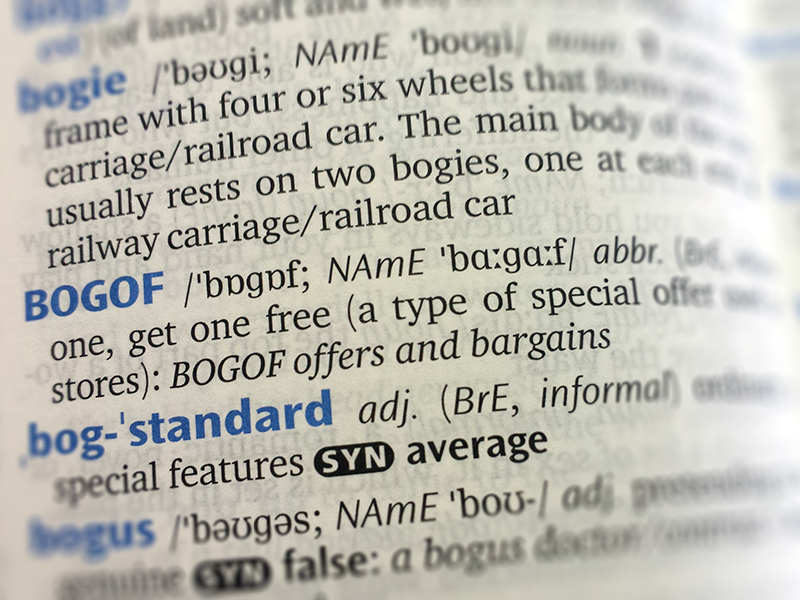 Ian Brookes is a freelance writer and editor based in Scotland. He has edited a number of dictionaries and has written books about spelling, writing, and punctuation. In this post, he looks at how to learn two words for the price of one.
Ian Brookes is a freelance writer and editor based in Scotland. He has edited a number of dictionaries and has written books about spelling, writing, and punctuation. In this post, he looks at how to learn two words for the price of one.
There is something very attractive about the idea of getting two things for the price of one. One of the more striking new words to enter the English language in recent times is BOGOF. This is an abbreviation based on the initial letters of the phrase ‘buy one, get one free’; as this suggests, it refers to a special offer in a shop that allows you to receive an extra item free of charge when you make a purchase. The fact that the word is pronounced the same as bog off, which is a mildly offensive way of telling somebody to go away, makes it sound slightly rude, and this has no doubt added to its popularity.
If the idea of getting something extra for their money is attractive to shoppers, then learners of English should be encouraged by the idea that learning one word will often bring another word – and often more than one word – into their vocabulary, virtually free of charge.
If you learn a noun, you can often form a related adjective by adding a short suffix. For example, adding the ending -y creates chilly from chill, cloudy from cloud, and dirty from dirt.
Similarly, many verbs give rise to a noun that ends in either -ment or -tion: entertain, govern, and measure lead to entertainment, government, and measurement, while collect, educate, and invent lead to collection, education, and invention.
If only you could apply these suffixes to every noun or every verb then you could increase your vocabulary enormously. Unfortunately, English is rarely as simple as that. You can’t just add the ending -y to any noun. For example, there are no words booky or cuppy. And even when you can add a -y to a noun, the meaning may not be what you expect: thus catty means ‘spiteful’ rather than ‘like a cat’ and not all bosses would like to be described as bossy.
However, there are some typical patterns of word generation that are worth knowing, and in this blog I want to look at how verbs with certain endings tend to generate a related abstract noun ending in -tion or -sion.
The most common pattern here is that verbs that end in -ate will usually form an abstract noun ending in -ation: calculate/calculation, celebrate/celebration. Other common patterns are that verbs ending in -ize (or -ise in British English) form nouns ending in -ization/-isation (organize/organization) and verbs ending in -act and -ect form nouns ending in -action and -ection (react/reaction, connect/connection).
I should stress that not every single verb with these endings will form an abstract noun that ends in -tion. But most of them will, and when they do, the noun is formed in a regular way, with no change to the stem of the word.
However, there are some interesting verb endings that form abstract nouns in less obvious ways:
- Verbs ending in -duce form nouns ending in -duction: produce/production, reduce/reduction.
- Verbs ending in -mit usually form nouns ending in -mission: permit/permission, admit/admission.
- Verbs ending in -cede usually form nouns ending in -cession: recede/recession, concede/concession.
- When other verbs ending in -de form abstract nouns, the nouns end in -sion: decide/decision, explode/explosion, intrude/intrusion.
Keeping these points in mind can help learners to increase their vocabulary two words at a time rather than word by word: learn one word, get one free!


[…] Ian Brookes is a freelance writer and editor based in Scotland. He has edited a number of dictionaries and has written books about spelling, writing, and punctuation. In this post, he looks at how … […]
[…] Ian Brookes is a freelance writer and editor based in Scotland. He has edited a number of dictionaries and has written books about spelling, writing, and punctuation. In this post, he looks at how … […]
Thanks for the hints! It is what I usually do in my classes hoping my studennts improve their vocabulary, but here the list is organised and clear. To keep in mind! Thanks again!
[…] Ian Brookes is a freelance writer and editor based in Scotland. He has edited a number of dictionaries and has written books about spelling, writing, and punctuation. In this post, he looks at how to learn two words for the price of one. […]
The idea to enhance vocabulary this way sounds tempting and interesting. However, in the classroom situation it does not work for long time as students easily know that they are being lured into learning. However the idea to teach children this way particularly in senior classes, it can work. I am going to try it soon. Thanks for suggesting this method.
R.Sharma
I like to learn